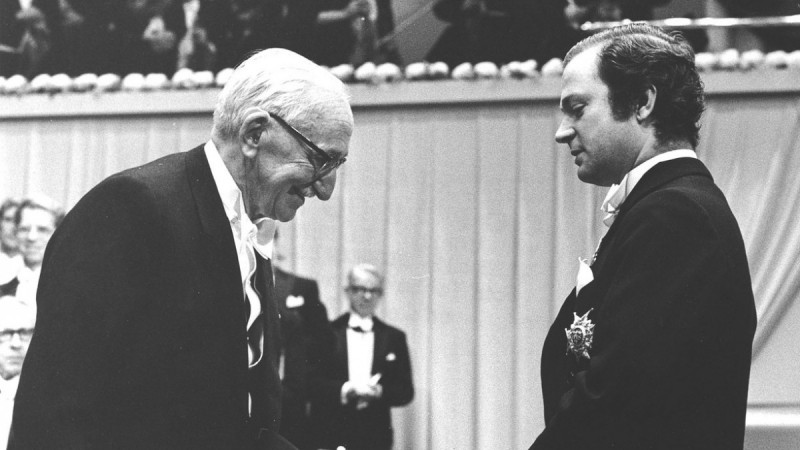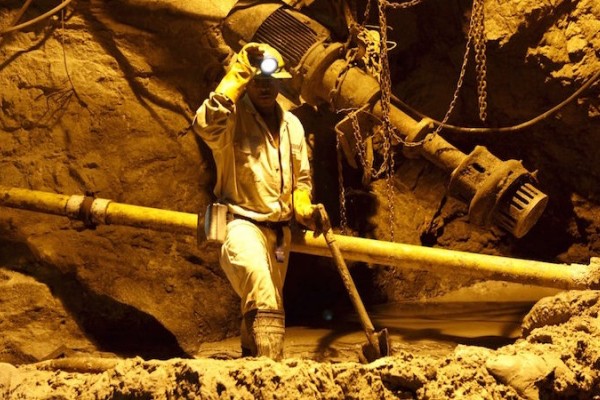Munk, Hayek and the Fraser Institute: Tracing the insurgent pedagogy of the Canadian right
We are witnessing a troubling expansion of market fundamentalist propaganda from beyond think tanks and media elites

Peter Munk. Photo courtesy of the Munk School of Global Affairs and Public Policy/University of Toronto.
This was the title of one of the latest webinars hosted by the Fraser Institute, a British Columbia based think tank well-known across Canada for its promotion of right-wing propaganda and links to dark money and Big Oil.
Why, you might ask, are we subscribed to the Fraser Institute’s mailing list? Obviously, we want to keep up with what’s going on across the Canadian right-wing ecosphere, but more specifically because, two years ago, we attended one of the institute’s day-long seminars geared at convincing undergraduate students and high school teachers that free market fundamentalism is the answer to all of Canada’s social and economic ills.
We’ve been subscribed to the newsletter ever since.
This article briefly recalls that strange experience, and traces the funding for the event to the darker corners of neoliberal and even authoritarian thought on the Canadian right and beyond.
Funded by a $5 million donation from now deceased Barrick Gold mogul Peter Munk and his charitable organization, the Aurea Foundation, the Peter Munk Centre for Free Enterprise Education is a cluster within the Fraser Institute designed to teach students, teachers, and journalists the fundamental value of free market economics.
Having been well acquainted with Munk’s history as a leading funder of neoliberal think tanks, we thought it was important to keep an eye on exactly what his money was being spent on, and to whom the Aurea Foundation was sending donations.
The seminar we attended took place in February 2018 inside a conference room in a budget downtown Toronto hotel. Despite being a public event, we worried that we might be outed as York University PhD students, but when we arrived, the greeters at the check-in table didn’t mention it.
What was lacking in resistance was made up for by a spread of books placed near the entrance including titles by neoliberal economists like Friedrich Hayek, Milton Friedman, and James Buchanan. The plethora of free, budget-quality printed materials set the stage for the event, which was well attended by eager undergraduate students. We took our place at the back of the room, trying to stay out of the way and not interfere with the proceedings.
The itinerary listed five presentations: two were delivered by George Mason University professors working for the Koch brother-funded Mercatus Center who spoke about the free market and technology, with one focusing on a fawning biography he wrote on Hayek. The title slide displayed the Austrian economist in a face-off with rival John Maynard Keynes—the image was composed as if it was an advertisement for a title fight on pay-per-view.
Two of the other talks were by Fraser employees. One was delivered by the institute’s chair of “Economic Freedom Research” entitled “The Global impact of Economic Freedom,” and the other by the director of “Provincial Prosperity Studies” who presented “Fighting Poverty In Ontario: The Minimal Impact of the Minimum Wage.”
We use the term “presentation” loosely, as the slide decks mostly contained references to other error-ridden Fraser reports, and sourced various right-wing think tank heuristics. The claims contained in the presentations would be familiar to any policy enthusiast with even the faintest of progressive leanings as they were largely surface-level arguments recycled from the 1970s and 1980s, using charts praising economic freedom as the key indicator of personal happiness, and graphs heralding free market reforms by murderous dictators including Chile’s General Augusto Pinochet.
One of us feverishly took notes in a Fraser branded notebook, jotting down all of the logical fallacies and use of correlation in lieu of causation, observing the presenter’s ideologically-constructed propaganda masquerading as academic research.
The air in the room was thick with unchallenged, yet completely discredited ideas, but it was not our place to intervene.
We intended to write something shortly after the event concluded regarding our experience and tracing the money that funded such conferences while further analyzing the ideological goals of directing educators to transmit free market propaganda to their students.
Why didn’t we? Well, as it happened, Peter Munk died a month and a half after the seminar took place.
When he passed away, the Canadian media praised Munk as a “magnificent” man full of “wisdom, guidance, charm and wit,” while many mainstream newspapers praised his philanthropy and the Munk Debates (which had just platformed fascist and white nationalist Steve Bannon). There was very little mention of the small fortune Munk gave to far-right groups or the appalling human rights record of the companies he owned.
Amidst the torrent of uncritical praise from across the liberal capitalist spectrum, we wanted to avoid being seen as dancing on the grave of a departed noagenarian who had fled the Nazis and arrived as an immigrant to Canada after the war, later creating a wildly successful business empire.
But the project to understand the ideological and material linkages between Hayek, Munk and the Fraser Institute is too important to be ignored. The foundational basis of these linkages is set in neoliberal reason, but even more specifically in protecting traditional hierarchies by rejecting the idea of the social as a consenting body for government.
Friedrich Hayek, left, accepts the Nobel Prize for Economics in 1974.
The entire premise of Hayek, Munk and the Fraser Institute’s thought rests on undercutting all democratic oversight and restricting the role of the state to very limited functions of regulation and minimal taxation. As Wendy Brown illustrates, Hayek’s ideological project centers around the privileging of the idea of the free market over all other institutional processes in any form of national government.
One of Hayek’s main ideas is based around the argument that rule of law and free market principles are being destroyed by the growth of collectivist policies, mass democracies, and the concept of the state’s accountability to its citizens. This has much in common with James Buchanan’s comments at the 1954 Mont Pelerin Society meeting where he argued that the “maintenance of free society may well depend on the removal of certain decisions from majority-vote determination, not least so that the pressures for redistribution on the part of the masses could be averted.”
Buchanan is, of course, the scholar most praised by the Koch brothers. The US billionaires (David Koch died in 2019) have been proponents of Hayek and the Fraser Institute as well, with Koch foundations donating approximately $1.4 million from 1997-2017.
The best way to understand the form of government promoted by Munk, Hayek, the Fraser Institute and the Kochs is to look at it as a sort of authoritarian liberal constitutionalism, or the total privileging of economic liberalism at the expense of social or political liberalism (which Hayek and his proponents claim naturally follows).
For example, earlier we mentioned the Fraser Institute’s tendency to praise free market reforms in Chile without considering the context of Pinochet’s mass murder regime and other grotesque human rights abuses. The problematic example of Chile has been the backbone of not only much of Hayek’s thought on authoritarian liberalism, but also Munk’s himself.
In a 1978 letter, Hayek wrote “I have not been able to find a single person even in much maligned Chile who did not agree that personal freedom was much greater under Pinochet than it had been under Allende.” Hayek’s own contradictions regarding his views on authoritarianism aside, claiming the inability to find a single person who was murdered or imprisoned by the dictatorship is a flippant claim to make.
However, it makes perfect sense when you understand what he means by “freedom” and who gets to enjoy it. For his part, Munk agreed with the entirety of Hayek’s sentiment. During a 1996 Barrick Gold shareholders meeting, he stated:
They can put people in jail, I have no comment on that, I think that may be true… I think [the end justifies the means] because it brought wealth to an enormous number of people. If you ask somebody who is in jail, he’ll say no. But that’s the wonderful thing about our world: we can have the freedom to disagree.
When questioned later regarding this statement, Munk doubled down. “Maybe I’m less sensitive to these issues because I see that what people need first is economic security,” he said. “Only when they have that can they afford to focus on human rights.” Indeed, to Munk, the alternative to liberalized economies was the “true enslavement of the people.” By reducing any normative claims to freedom and justice as being represented by economic freedom (of some, not all), Hayek and Munk privilege liberal economic freedom over political freedom.
When further discussing Pinochet in 1981, Hayek stated: “At times it is necessary for a country to have, for a time, some form or other of dictatorial power […] Personally, I prefer a liberal dictator to a democratic government lacking in liberalism.”
These were the principles echoed throughout the words and thin heuristics provided in Fraser literature and in the presentations we heard at the 2018 event. There was lots of talk, too, about market and economic freedom, yet very little discussion about what a state looks like in this system. Why? Because it is based on these arguments by Hayek and his supporters who advocated—either implicitly or explicitly—for “transitional authoritarianism” (in their estimation, this would lead to democratic reforms following the downfall of Pinochet).
The Fraser Institute awarded Munk with the T.P. Boyle Founder’s Award in 2010, “in recognition of his unwavering commitment to free and open markets around the globe and his support for enhancing and encouraging democratic values and the importance of responsible citizenship.” The award is further described as being presented for outstanding entrepreneurship and dedication to free enterprise. These are the similar principles in which Munk’s Aurea Foundation allocates its money, giving special attention to policy issues like the “economic foundations of freedom” and “the strengthening of the free market system.”
The Aurea Foundation has donated millions of dollars to far-right think tanks in the last decade, including millions to the Frontier Centre for Public Policy, an organization which has consistently published articles arguing that pandemic related lockdowns and attempts to alleviate COVID-19 are tyranny and should be resisted (along with more blatant conspiracy theories by an author who also writes for The Epoch Times).
Fraser Institute, 2016 Annual Report
Fraser’s Munk Centre bragged that in its first year it held over 20 programs that were attended by 26,000 high school and university students and teachers. The program sponsors essay-writing contests so biased and lacking academic rigor that they have been banned from contacting high school students by some school boards. One essay contest asked participants to argue why increasing the minimum wage is bad policy, mimicking the anti-minimum wage presentation at the seminar we attended.
Organizationally and intellectually, the operation is an incestuous cross-pollination from above. The explicit goal of the Munk Centre is to disseminate free market ideas across the education sector, from high school and university students, to educators, and journalists.
Like the Koch’s funding of academics at George Mason University and other institutions, Munk donated $35 million to the University of Toronto, funds that were specifically earmarked for international relations and human rights programs at the Munk School for Global Affairs and Public Policy—fields that should view his objectionable human rights record as the head of Barrick Gold with a heavily critical eye.
However, such ideas cannot reside solely in elite circles in order to become widely accepted as common sense and truth. The Fraser Institute and the rest of Munk’s Hayekian proponents are adept at reproducing the free market as an ideological principal and it is not accidental that they target high school students and undergraduates with regular, carefully-worded essay contests, presentations, and hordes of free fanzine material written by core Munk-funded scholars, in addition to the requisite gift cards, certificates, and other prizes each Fraser seminar offers.
The Munk supported, free-market propagating machine realizes that its core ideas must be circulated among the masses and boosted by carefully placed thinkers in education, rather than by economic elites and bankers (who often support such ideas themselves).
What we are witnessing is the expansion of market fundamentalist propaganda from beyond think tanks and media elites, directly to what they deem as the primary consumer of information: students. For decades the right has constructed a myth of Marxist university campuses needing to be combatted by “free speech” and the promotion of reactionary social and economic views.
With these seminars and education programs, it appears they have found their way around the academy entirely. It is clear we need to expand our resistance and critique of the Fraser Institute beyond the reports it publishes and the ideologues and media pundits it puts in front of the television cameras. If these ideas go uncontested, we stand to lose a growing number of students to far-right economic views.
The Peter Munk Centre for Free Enterprise Education is a real threat and we should treat it like one.
Ryan Kelpin is a doctoral candidate in the Department of Political Science at York University. His area of research pertains to Toronto and Ontario politics, neoliberalization, and de-democratization.
Benjamin Johnson is a PhD candidate of political science at York University. His research focuses on Arctic politics, technology, and security within the fields of Canadian studies and international relations.










